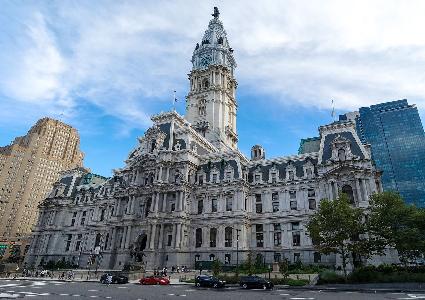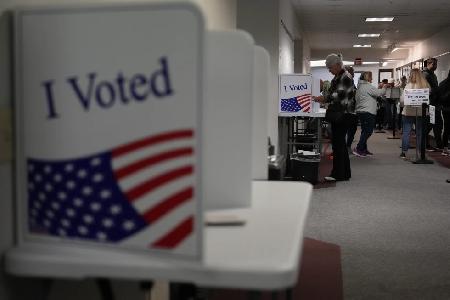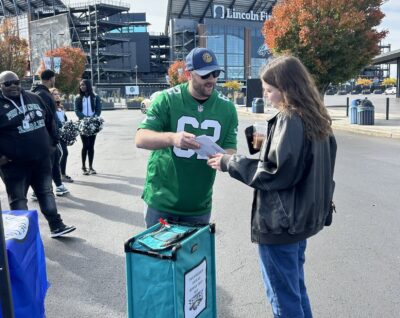Picture Old City overwhelmed by a procession of independent workers carrying desks, chairs and laptops up Third Street. Add a lively marching band ushering them along and the evening news to document it.
“Can you imagine if Channel 6 had a helicopter in the sky?” Alex Hillman asks Geoff DiMasi, joking with his business partner in a conference room.
“It would be insane. Weï’d stop traffic,” he says, laughing chirpily.
Hillman and DiMasi run Independents Hall, a shared office space that rents desks to self-employed workers though they’d cringe to hear it described so antiseptically. To them, the space is an environment for a community, and the inevitable collaboration that comes from putting freelancers in close proximity.
In the two years since its inception, the number of freelancers interested in IndyHall (as it is popularly known) has grown dramatically, prompting Hillman and DiMasi to consider relocating from their current digs on Strawberry Street. They hope to make the move in May. If they pull it off, they’ll not only put Philly on the coworking map; they’ll be in the vanguard of the coworking movement.
It was late 2006 when Hillman first heard of “coworking” a work-culture experiment in San Francisco. He was beginning a career as a freelance Web developer and experiencing the isolation of working from home; he missed hanging out with the “cool, smart people” that were part of most of his office gigs. But he had no intention of going back to a company. He’d made more money moonlighting in his free time than in his last day job.
He spent some time networking, trying to sell the concept. In March 2007, his idea reached 38-year-old Web designer and University of the Arts professor DiMasi.
“I had a lot of experience with shared spaces in the artist world,” DiMasi says, stretching his lanky frame as he leans back in his chair. “When Alex was explaining it to me, I’m like, ‘I’ve been in this model for many, many years. Let’s talk.”
After persuading two dozen colleagues to share the space, the partners opened for business.
IndyHall offers three membership options: $25 per month for a basic membership, which gives you a desk once a month; $175 a month for a desk three days per week; and $275 a month for full-time members, who have 24-hour access. When the space opened, there were two full-timers and 27 others. A year later, the business had quadrupled its full-time memberships to eight. This March, full-time membership could have doubled again, but fell short because space ran out.
“In January, our reservation system, which had rarely been used started blowing up,” Hillman says. “I asked other space owners, ‘Did you get a big influx, too? Is the economy helping you guys?”
It’s too early to know whether self-employment has been trending upward in Philly since the recession hit (between 2002 and 2005 the last time data on entrepreneurship was collected, it rose from 13.5 percent to 15 percent). Meg Shope-Koppel, director of research at the Philadelphia Workforce Investment Board, says that “as recessions begin, some industries start using more contractual workers, though it’s not going to be a huge spike, because in some areas, businesses are failing.”
In March, Hillman and DiMasi held a meeting to discuss the influx. In front of a crowd of about 40, the partners unveiled their plan to lease a 4,400-square-foot space, more than double the size of the current office.
They admitted that the decision to move would be risky, since the company had just signed a 12-month lease on the Strawberry Street location. They could transform the smaller space into an “education center,” where members could teach or take classes. But even then, IndyHall would need the community’s full support before it could consider relocating.
As Hillman played a video walk-through of the new space at Third and Church streets, members whistled. They nodded at the idea of being able to earn additional income from teaching classes. One member waved a wallet above her head, promising to write a check as soon as she could.
By the following weekend, 17 people had upgraded their commitment or signed on as new members. In the three weeks since, total membership has increased 30 percent to 68 members from 53. Even some non-members have offered to lend or give money.
According to Tony Bacigalupo, co-author of I�m Outta Here! How Coworking Is Making the Office Obsolete (Not an MBA Press), there are currently 70 coworking spaces in 30 cities globally. But Philadelphia�s venture is making strides beyond its peers.
“There was a perfect storm of circumstances that made it possible for IndyHall to be this far ahead of the curve,” Bacigalupo says.
Part of that storm includes the partners’ willingness to reinvest in the space, he says. Neither Hillman nor DiMasi profit from the venture: “every penny” goes back into the business, for amenities and upgrades requested by the community.
Bacigalupo also credits the synergy of Hillman’s “millennial, change-the-world attitude”and DiMasi’s behind-the-scenes wisdom for much of IndyHall’s success.
The partners would tell you credit is owed to the community.
“The community pushes and it gets to the point where they’re pushing so much that we have to listen,” DiMasi says.
“This community is comprised of workers from a variety of vocations: from computer programmers to PR consultants, designers to market researchers. Some came to escape isolation. Others came for networking opportunities.”
But for everyone, collaboration is inevitable: Full-time member Bart Mroz, for instance, runs a creative agency focused on e-commerce with other members. Gloria Bell runs a consulting firm for entrepreneurs, some of whom she finds at IndyHall.
Above the desks and laptops at IndyHall, a half-dozen starfish tear apart Philadelphia landmarks in a painting created by office manager Dana Vachon. The painting is inspired by The Starfish and the Spider (Portfolio) by Ori Brafman and Rod A. Beckstrom, a manifesto on community-driven organizations and the impetus for Hillman and DiMasi’s vision of coworking.
The book posits that a unique evolutionary quality of the echinoderm represents a new way to organize business. Spider organizations, with top-down, centralized leadership and long, pluckable legs, can’t scurry far with their heads cut off. But sever a starfish’s arm and not only will it regenerate a replacement, but the mutilated limb becomes a new starfish.
“There is no centralized entity for coworking. You can’t kill it. There is no head to chop off,” Hillman says.
Perhaps that’s why Hillman and DiMasi are so confident about signing the lease on the new space. They admit the move is aggressive. But they believe it’s sustainable, too.
“At this point, the project has taken on a life of its own,” Hillman says.
Before you go...
Please consider supporting Technical.ly to keep our independent journalism strong. Unlike most business-focused media outlets, we don’t have a paywall. Instead, we count on your personal and organizational support.
Join our growing Slack community
Join 5,000 tech professionals and entrepreneurs in our community Slack today!

Trump may kill the CHIPS and Science Act. Here’s what that means for your community.

A week before Election Day, some Philly city employees question unexpected website change

A Pennsylvania voter’s guide to tech policy on the ballot in the 2024 election

